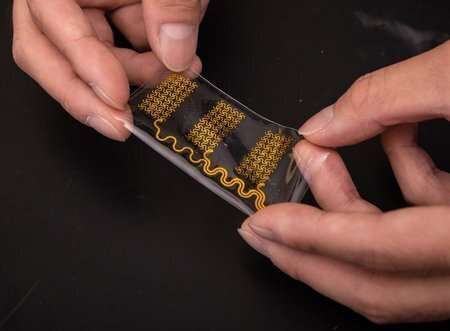Best of Last Week—Unknown structure in galaxy, new skin for robots, supplements slow macular degeneration

It was a good week for space science as a team of researchers at NASA announced that they were looking forward to getting a glimpse of a world that constantly burns. The James Webb telescope will soon focus on 55 Cancri e, an exoplanet so close to its star that its surface is likely covered in lava. Also, a team of space researchers affiliated with several institutions in Japan analyzing data from ALMA discovered an unknown structure in the galaxy courtesy of high contrast imaging. And a team of astronomers in Australia detected a new radio source of unknown origin emanating from somewhere in the spiral galaxy NGC 2082.
In technology news, a team at the University of Houston developed an alternative to lithium batteries—a solid-state sodium-sulfur battery that works at ambient temperatures. A team working at the U.S. Department of Energy's Brookhaven National Laboratory developed an electrolyte additive that offers a lithium battery performance breakthrough—specifically, a lithium difluorophosphate that allows for improvements in low-temperature battery performance. And a team at California Institute of Technology developed an artificial skin that gives robots a sense of touch. It can also sense pressure, temperature and whether a given material is toxic. Amar Singh, an assistant professor at Banaras Hindu University, explored the differences between intelligence and consciousness in future artificial beings by drawing parallels between them in the fantasy film "Being John Malkovich."
In other news, a team of researchers from several institutions in the U.S., China and the U.K. reported that a person's height can impact their risk of several diseases. Tall people, for example, were found to be more at risk for atrial fibrillation but at less risk of heart disease. Also, a team at the Foundation for Applied Molecular Evolution made a breakthrough in determining life's origins on Earth, and perhaps on Mars. And finally, in a study funded by the U.S. National Institutes of Health, a team from several institutions in the U.S. confirmed the benefit of taking OTC supplements to slow age-related macular degeneration.
© 2022 Science X Network